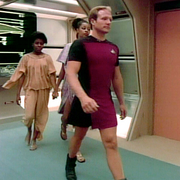Star Trek is one of the longest-running and most popular television franchises in history. It is a science fiction series that deals primarily with the human condition and the relationship of life forms to one another and to their technology. It bears many similarities to its predecessor in science fiction television, The Twilight Zone.
In addition to 6 different series, the franchise has spawned 11 films and a large slash community.
Contents
Social Commentary
This first episodes were aired in 1966 but some of the episodes were actually filmed as early as 1964. Since then, each series has been both a product of its time and decidedly progressive. The Original Series included Nichelle Nichols' character, Lieutenant Uhura, as possibly the first Black female character on television who wasn't a nanny or a maid[1]. It also featured the first on-screen interracial kiss, between Nichols and William Shatner[2]. It also attempted to point out the absurdity of racism with "Let This Be Your Last Battlefield."
Star Trek: The Next Generation continued this tradition of progressiveness by featuring a disabled cast member (Geordi LaForge, born blind), and including references to having abolished the practice of raising animals for food. (Lonely Among Us, 1987) It also dealt with homosexuality and gender in the episode "The Outcast." (1992)
Despite these progressive overtures, there are many examples of sexism in Star Trek as well. There was no female captain in the role of lead character until Captain Janeway in the Voyager series. Women in The Next Generation were mostly relegated to nurturing functions, a doctor and a counselor being the two most prominent female characters, however Lieutenant Tasha Yarr had the role of chief security officer. In the Original Series women were prohibited from being Starship captains and wore revealing outfits.

A male crewperson in the Next Generation wearing an updated version of the scant worn by women in the Original Series
Subsequent series attempt to address the sexism in previous series while remaining true to preestablished canon. In The Next Generation both men and women can be seen wearing the revealing skirts which in the Original Series were worn only by women. The opening "Where No Man Has Gone Before" monlogue from the Original Series is updated in both The Next Generation and the JJ Abrams film to be gender neutral. In the Original Series the Orion slave girls are a race of sex slaves who are willingly objectified, but in Enterprise it is revealed that the Orion slave girls are actually the enslavers, using their phermones to control men.
Behind the scenes
TOS
- Grace Lee Whitney, who played the role of Janice Rand, reported that she had been sexually assaulted by an executive associated with the series.
TNG
- Denise Crosby, who played the role of Tasha Yar, told in an interview: "I think they would have been very happy for me to wear really tight outfits and heels and stick my tits out - believe me, they suggested it, those very words were actually used."[3]
Female characters
TOS
- Number One: First Officer (in the pilot)
- Lt. Nyota Uhura: Communications officer
- Christine Chapel: Nurse (in the series), Doctor (in the movies)
- Ensign Janice Rand: Yeoman
- Saavik: Started as a lieutenant junior grade in the second, third and fourth Original Series movies.
TNG
- Lt. Tasha Yar: Chief security officer (prior to Worf)
- Deanna Troi: Ship's Counselor
- Ensign Ro Laren: Later promoted to lieutenant prior to her defection from Starfleet
- Ambassador Lwaxana Troi: Ambassador from Beta Zed and mother of Deanna Troi
- Lt. Commander Beverly Crusher: Chief medical officer
- Leah Brahms: Engineer responsible for the design of the Enterprise warp core
- Guinan: Bartender in Ten Forward, member of the El-Aurian, a race of "listeners"
- Dr. Pulaski: Chief Medical Officer for the second season
DS9
- Kira Nerys: First officer of DS9, Major in the Bajoran militia and former resistance soldier.
- Jadzia Dax: Chief science officer
- Ezri Dax
- Kasidy Yates: Civilian freighter captain
- Leeta: Dabo girl
Voyager
- Kathryn Janeway: Captain
- B'Elana Torres Chief Engineer
- Kes: Medical Assistant
- Seven of Nine : Astrometrics
- Seska : Spy
- Delaney sisters : Astrometrics
Enterprise
- T'Pol: Vulcan Subcommander, Science Officer, First Officer and Starfleet Commander
- Hoshi Sato: Ensign, Communications Officer
- Engineering Officers
- Command Division Crewmembers
- Helmsperson
- Operations Division Crewmembers
- Tactical Officers
- Medical Officers
- Science Division Crewmembers
Characters with disabilities
- Geordi La Forge: Chief Engineer
Female writers
TOS
- D.C. Fontana (pseudonym: J. Michael Bingham)
- Jean Lisette Aroeste, MLS
- Margaret Armen
- Judy Burns
- Joyce Muskat
- Shari Lewis
TNG
- Vanna Bonta
- Diana Dru Botsford
- Jeanne Carrigan-Fauci
- Sarah Higley (pen name: Sally Caves)
- Sara B. Cooper
- Diane Duane
- D.C. Fontana
- Katharyn Powers
- Hannah Louise Shearer
- Jacqueline Zambrano
- Wanda M. Haight
- Melinda M. Snodgrass
- Jeri Taylor
- Vanessa Greene
- Hilary J. Bader
- Kacey Arnold-Ince
- Jeanna F. Gallo
- Shari H. Goodhartz
- Antonia Napoli
DS9
- Majel Barrett-Roddenberry
- Jeanne Carrigan-Fauci
- Truly Barr Clark
- Jill Sherman Donner
- Hilary J. Bader
- Jane Espenson
- Cindy Marcus
Voyager
- Robin Jill Burger
- Skye Dent
- Dianna Gitto
- Hilary J. Bader
- Janet Nemecek
- Lisa Klink
Enterprise
- Maria Jacquemetton
- Judith Reeves-Stevens
Commentary
- Star Trek: Warp Factor Sex (The Guardian) -- criticises sexism in J. J. Abrams' reboot of the franchise.
- now that we've got that clear, and you know that I'm not here -- points out lack of consideration for intersectionality in various criticisms of the franchise.
- Sexualized Saturdays: The Sexist & Racist Themes Portrayed Through the Orion Slave Girls -- criticism of the Star Trek franchise's handling of the Orions, including Enterprise's use of "it's really the women in control" to excuse sexual slavery and rape culture

